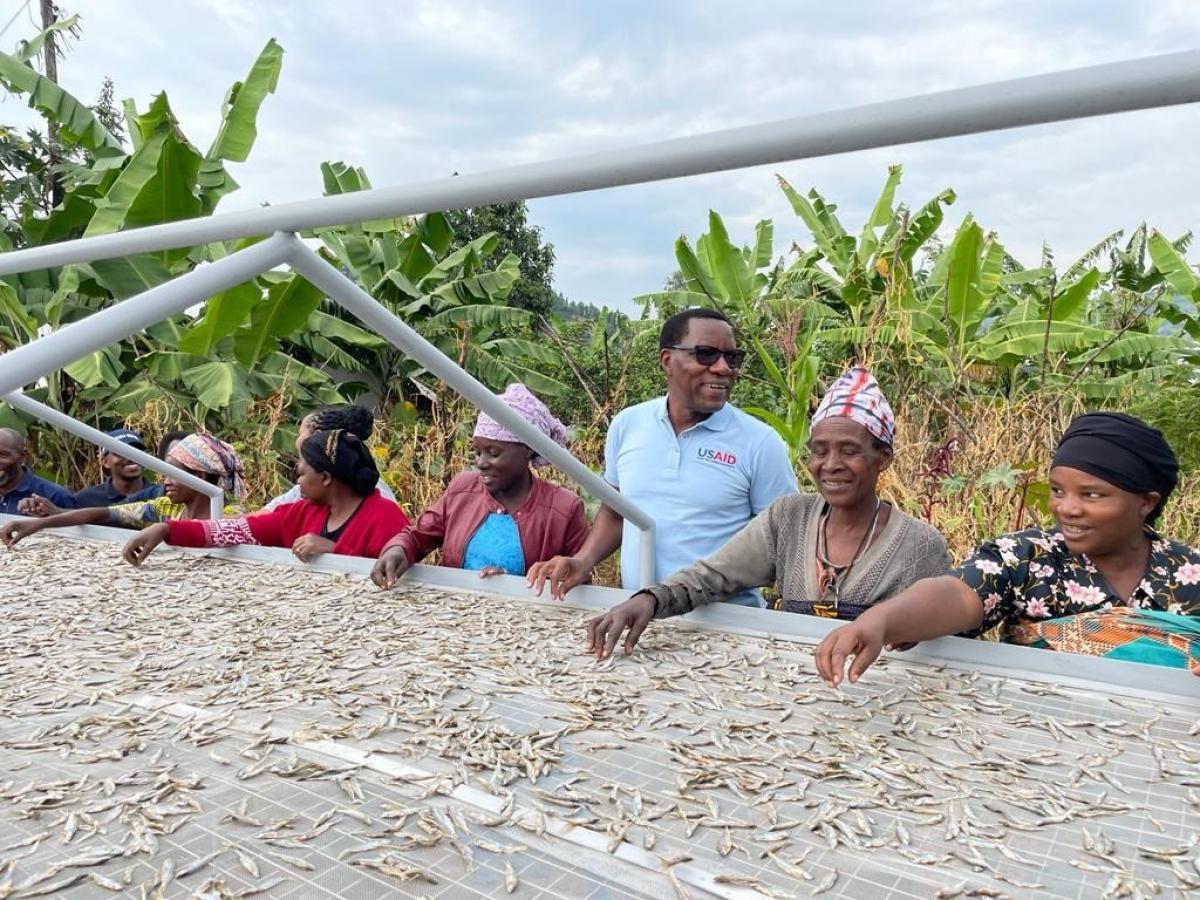Fish is Good Business: Women Entrepreneurs in Rwanda Double Sales and Profits
Fish might have been overlooked as a quiet trade barely allowing farmers to survive, but those days are far behind us now, all thanks to a women’s cooperative that decided to pull the fish business out of the muck.
In a sleepy village where twin lakes Burera and Ruhondo shape a picturesque landscape, a group of fish farmers struggled to get their business off the ground. "We were working so hard, but it felt like we were running in circles," shares Marie Mukamana, one of the women leaders of the Fish Sellers Union UVEPO.
Primary TextWe lacked the tools and knowledge to compete in the market. Our fish was our livelihood, but we couldn’t reach its full potential.
UVEPO is a union of six cooperatives with 184 members, 157 of whom are women. For years, they worked tirelessly, never succeeding in turning a solid profit from their fish business. “We would harvest fresh small fish and sell it as-is directly, but customers preferred them dried. We weren’t aware of proper practices in harvesting and drying, and we lost so much in the process,” recalls Beatrice Nyiramakuba, another member of UVEPO.
Indeed, without the infrastructure for proper fish drying, storage, and transportation, and with limited knowledge of hygiene practices, the quality of their fish remained low, making it difficult to increase sales and support their families. UVEPO’s members would harvest only six to eight metric tons (MT) of small fish per quarter, a number that barely sustained their needs. Something needed to change; they just didn’t know what. But they were ready to do what it took to transform their modest fish farming operations into a vibrant and profitable business.
In 2022, hoping to get some help for their business, UVEPO partnered with the USAID-funded Feed the Future Rwanda Orora Wihaze Activity. The project staff provided training on small fish harvesting, handling, and marketing, and also taught the UVEPO members some essential hygiene practices.
Primary TextThe joy of seeing our hard work pay off is beyond words," Marie says with a smile. "We no longer feel left behind. We have hope for the future, not just for ourselves, but for our children and our community.
Their success is part of a broader initiative by the Feed the Future Rwanda Orora Wihaze Activity, which collaborates with local government and communities to increase the availability and consumption of animal-sourced foods through a market-driven approach. UVEPO is just one of over 70,000 Rwandan small livestock producers benefiting from the support, helping to ensure better nutrition and sustainable incomes for families across Burera, Rutsiro, and Nyamasheke districts.
For these women, the transformation is more than just increased harvests or higher sales. It’s about empowerment, dignity, and a brighter future for their entire community.
Through this project, USAID helped establish six fish collection centers, all equipped with modern drying racks to ensure product quality and safety. It also helped UVEPO open sales outlets in their communities, so people didn’t have to go far to purchase fish.

Laetitia Umulisa for Feed the Future Rwanda Orora Wihaze

Laetitia Umulisa for Feed the Future Rwanda Orora Wihaze Activity.
UVEPO members proudly show their freshly harvested sambaza in Burera District, Rwanda.
Sambaza, sardine-like fish, are a local delicacy in Rwanda. Known for their high nutritional value, sambaza are a staple food in lakeside communities, contributing protein and essential nutrients to the daily diet.
Primary TextBefore, we didn’t know how much more we could achieve with just a little more knowledge and support," says Jeanne, an UVEPO member.
Now, we’re not only fish vendors, we are community leaders.
To create demand, the UVEPO members shared valuable information about the high nutritional value of fish, and taught communities about the minerals found in fish that are especially important for a balanced diet fo rgrowing children. Marie, Jeanne and other members of the Union leveraged these lessons to engage village nutrition school programs and grow their customer base.
The results were life-changing. Post-harvest losses were cut in half, allowing UVEPO to now harvest between 12 and 15 MT of fish per quarter, almost double what they used to produce. Their sales surged from six million Rwandan Francs to a remarkable 14 million Rwandan Francs per season.
Primary TextWe’ve learned that when women come together, we are unstoppable. This is only the beginning, Jeanne says.
Feed the Future Rwanda Orora Wihaze Activity, implemented by Land O'Lakes Venture 37, works with local partners and private sector actors in Rwanda to strengthen the animal-sourced foods market system.
To learn more about the approach this project takes to ensure modern farming practices take root in Rwanda, please reach out to Innocent Cyiza at icyiza@usaid.gov. Explore what else USAID is doing to support economic growth in Rwanda by visiting our Economic Growth page.

